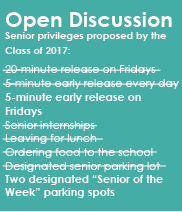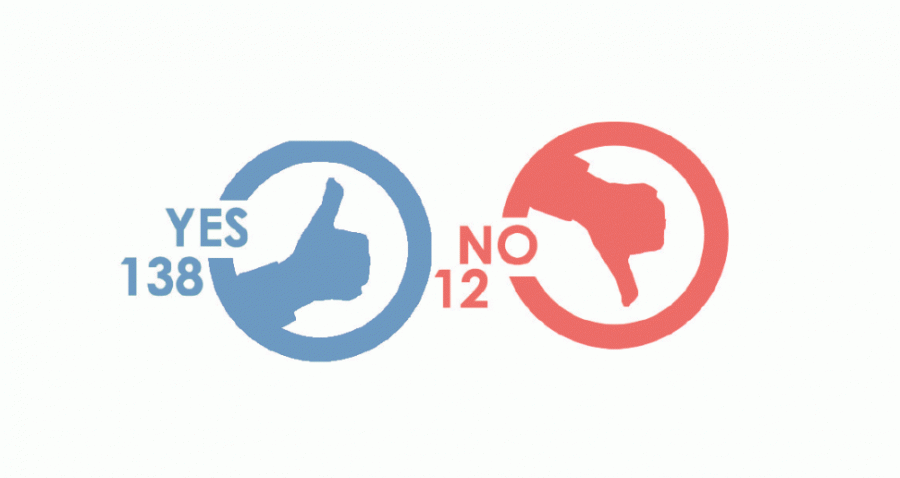Seniors should not expect privileges
Privileges support school divisions and sense of entitlement
November 22, 2016
At the start of each school year, students speak of them in the halls, barter with teachers about them and beg administration for more of them: senior privileges. In recent years, demands for senior privileges have become increasingly devoid of both logic and consideration for the restrictions placed on McLean administration by county and state regulations. With these flaws in mind, seniors need to recognize the ultimate lack of necessity of senior privileges and their potential detriments to student safety and the student body as a whole.
Senior privileges have become an expectation for McLean students, as seniors exercise their privileges and underclassmen eagerly await their turn to bask in the joy of a once-a-week five-minute early release. However, they are in no way guaranteed.
These privileges are nothing to squabble over, and McLean administration is minimally concerned with them.
“It’s more of a little bit of a show kind of thing for everybody, because [there are] so many things that people would like to have done [and]…with all the rules and regulations, that can’t be provided,” Principal Ellen Reilly said.
Although senior privileges were intended to help seniors become more independent and prepared for the real world, they have become a farce. They fluff the senior population’s sense of superiority while failing to grant any real rights to the legal adults confined to McLean’s halls.
This disconnect between purpose and practice that makes senior privileges pointless comes not from lack of representation of the student body or the cruelty of the administrators. It is due to the strict regulations imposed on public schools by the state and county.
According to Reilly, the state requires students to be in school for a specific number of minutes per year. Leaving campus during the school day interferes with a student’s ability to fulfill these requirements. Ultimately, the proposal for seniors to go off campus would cut into class time with possible disruptions and the exacerbation of student tardiness.
There is also the issue of student security. Students in the building—legal adults or not—are the responsibility of the school and county. If students were to have the ability to leave class at will or leave campus for lunch, a significant security risk would arise.
“There are reasons for [the limitations]. Because if [students left and] got hurt, it is the school’s responsibility,” Reilly said.
Many factors must be taken into account when considering requested senior privileges.
“Allowing such privileges…would become class disruptions in the halls if all seniors were released—it’s the instruction time that teachers [would lose],” Reilly said.
Reilly’s concern for classroom disruption is not exclusive to her and other administrators. Students like senior Sarah Kolyani have acknowledged the potential consequences of privileges that are, at their core, inconsiderate to staff and underclassmen.
“It’s unfair to teachers. When we leave, we take away from their time and our own education. We are at school to learn, not to leave to go to lunch and disrupt the school day or to cut out early,” senior Sarah Kolyani said.
Sadly, most students do not share Kolyani’s understanding of the greater implications the change in rules would cause. They have not been exposed to the facts of the matter—to implement more extensive privileges would reinforce a greater divide between seniors and underclassmen, negatively impact the learning environment and pose potential risks to their safety.
Students should be pleased with what has been allotted to them, yet view it as a thank you for good work for the past several years, not as some great blessing they have been cheated out of.





